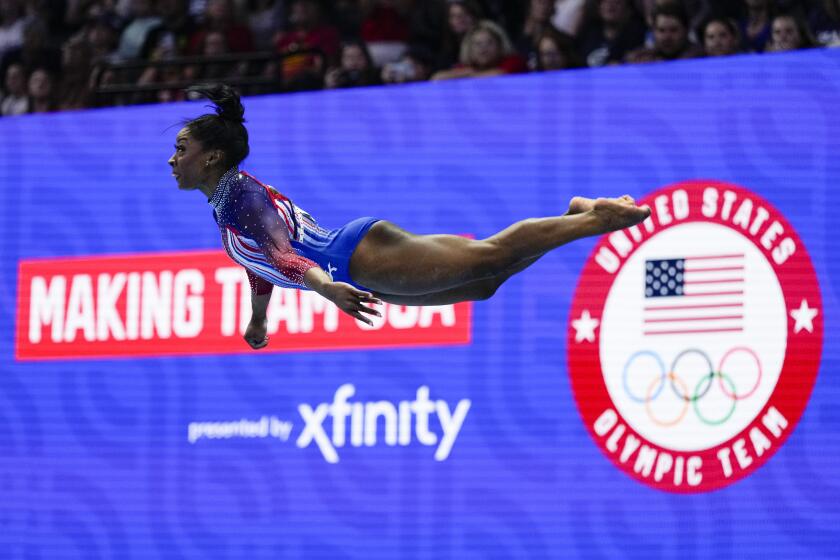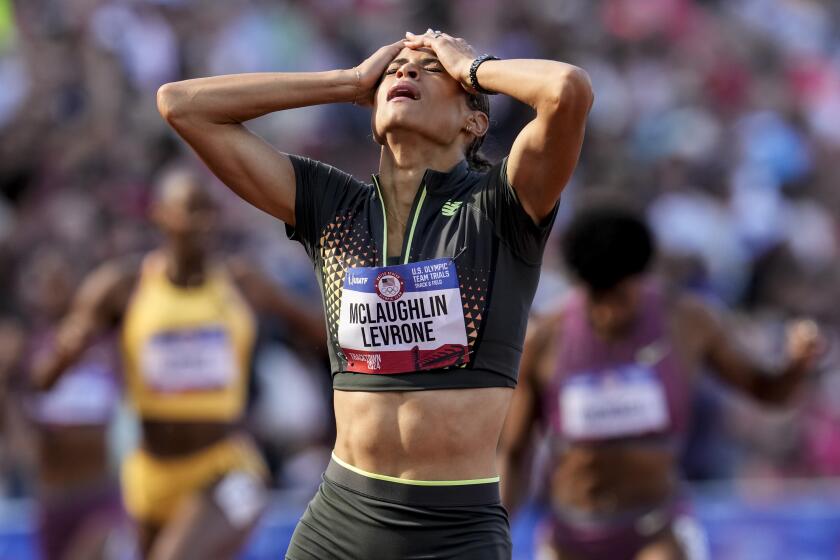Running for Respect : Alice Brown Has Won National Titles and Olympic Medals, but the Acclaim She Resolutely Pursues Remains Her Goal
She has won Olympic gold and been an American record-holder. She is the only woman to win a collegiate championship, The Athletics Congress championship and the Olympic Trials in the same year.
She would be the perfect candidate for an American Express commercial if not for a small hitch: To anyone but the most staunch track and field aficionado, not even her name is familiar.
So Alice Brown, 27, keeps coming back, still hopeful of earning her due. Forget the big houses and fancy cars the other stars of her sport own, she says, just once put her on the cover of Track and Field News.
Better yet, any sponsors out there? For the past two years, Brown has hustled her own transportation and lodging for out-of-town meets. That, she has found, can be a strain, particularly since she works part time and drives more than 100 miles each day from the San Fernando Valley to train at Mt. San Antonio College in Walnut.
Life in the fast lane was not supposed to be this way, especially after she accomplished so much. Eight years after being selected to her first Olympic team, Brown is still fighting her way through a detour on the transition road from Fleet Street to Easy Street.
“By now,” she said before a workout last week, “I thought I’d be married, have a couple of kids and a nice house.”
She laughed as she said it, but Alice Brown always seems to manage a laugh or a joke. In this case, however, it was half-hearted. Her eyes said it was the truth.
Had the United States not boycotted the 1980 Olympics in Moscow, she said, maybe she would have taken her last lap a long time ago.
“When I didn’t go in 1980, I wanted to go on to the next one, and then the next one turned out to be the next one, and so on,” Brown said.
Perhaps a good performance in ‘80, coupled with the medals she earned before family and friends at the ’84 Games in Los Angeles, would have left her content. Perhaps not.
Brown picked up an Olympic gold medal for running the first leg on the winning 4 x 100-meter relay team. She also earned a silver in the women’s 100-meter dash, placing second to countrywoman Evelyn Ashford.
Finally, she assumed, it was time to cash in on her many accomplishments. Surely the sponsors would stumble over themselves and there would be a cushy job offer or two.
Instead, nothing.
“I thought after the Games it might get easier, but if anything it was harder,” Brown said. “I was really disappointed. I don’t know whether I don’t have the personality or what the problem is.”
Brown’s recourse was to keep running.
“I still feel like I have to prove that I’m a quality athlete,” she says. “I think I can run faster. I’ve run under 11 seconds, but I haven’t done it without it being wind-aided. I think I can do it. That, and the gold in the 100 meters.”
And no, second place again won’t do.
“If you don’t win, nobody cares,” Brown says. “It’s sad, but it’s true.” And therein lies the problem.
Alice Brown has never been the best women’s sprinter in America. Even in 1980, when she won the Olympic Trials, she was never recognized as No. 1.
The rankings said she was best in the United States that year, but she was never made to feel that way. Brown simply was sitting on a borrowed throne as far as most track experts were concerned. Her coronation was only temporary while Ashford recovered from a muscle pull.
“It was like, ‘Why bother with Alice? She only won because Evelyn wasn’t there,’ ” Brown said.
Since then, she has been among the best, but she never again reached the top.
“She’s a hard-knocking veteran who had never really received the recognition she’s deserved,” said Al Franken, promoter of last week’s Pepsi Invitational at UCLA.
“It seems like there has always been someone like Evelyn Ashford around. Alice is like Steve Scott in the mile. They’ve always been among the best, but probably never the best. In some sports that’s not a problem, but in track and field, you don’t get your due unless you’re on top of the world.”
That said, it is somewhat ironic that Brown says the only run-in she has ever had with a meet promoter was with Franken and his son, Don.
Brown, who had never placed worse than second in a Pepsi meet, demanded an appearance fee to run in the 100 meters, and the parties haggled before an amount was agreed on, she said. The Frankens had wanted her to run for prize money only.
After that hurdle was crossed, Brown then proceeded to finish a disappointing fifth, prompting a phone call from Don Franken the next day.
“He told me Al was mad because I didn’t do as well as he hoped I’d do and he didn’t want to pay me,” Brown said. “I said, ‘ He’s disappointed?’ I wasn’t real happy with it either.”
Brown expects to get her money but doubts that the same phone call would have been placed had a bigger name suffered through a bad race.
The early morning phone call was the third indignity she had suffered involving that particular race in less than 24 hours. The first was the race itself.
As usual, Brown broke quickly. She ran well until the halfway point, then faded badly. “About the last 30 meters they really went by me,” she said of her competitors. “You could tell they switched gears and I didn’t.”
After reviewing the race in slow motion at the home of her personal coach, James Gilkes, Brown pinpointed the problem. Her arms were reaching out too far as she pumped them, causing her body to twist. “Technically, it was a bad race for me,” she said.
The second dose of humiliation Brown received was when she arrived home and flipped in a videotape of the meet as it had appeared on television.
“The announcer says, ‘Alice has had a bad year thus far . . . ‘ And I said, ‘Wait a minute! I haven’t even run yet this year, how can you say I’ve had a bad one?’ ”
Some athletes might have let such a comment slide. Brown cannot afford to.
“People pick up on things like that,” she said. “When you don’t have a sponsor and you have to call yourself to try and get a plane ticket, that kind of stuff hurts. People don’t know what I’ve had to go through. I trained myself for a long time looking for a coach. I have a long drive every day after work to go practice. People don’t know, but yet they say things like that. I guess all I can do is laugh. I just shake my head and laugh.”
Things weren’t always so tough. After Brown burst upon the international scene eight years ago as a Cal State Northridge sophomore, she was courted by track clubs eager to sponsor her. She also was courted by Bob Kersee, who became her coach with the World Class Athletic Club. But Brown and Kersee parted company in 1986, Brown left World Class, and she has been without private financial backing for the past year.
Despite that setback, Brown managed to place second at TAC in Nashville, Tenn., last year. But in doing so, she suffered a severe leg strain that sidelined her for three weeks before the World Championships in Rome.
Brown ran a respectable 11.07 in her qualifying heat at the World Championships but finished fourth and failed to make the final.
“Two others ran the same time but finished second and third and made it,” Brown said. “But when stories were written about it, it just said, ‘Alice Brown didn’t make the finals.’ No explanation.”
That, said Tony Veney, a former coach of the sprinter, is precisely the type of slight that stokes Brown’s competitive fire.
“All it does is make her drive and strive harder,” Veney, a Cal State Northridge assistant, said. “She’s been a standard-bearer for American track, right up there with Evelyn Ashford, but she has virtually been ignored. She’s out to prove herself. Sometimes it’s not enough to be good enough, you have to have a few breaks.”
When she returned from racing in Europe last summer, Brown had little money and no job. She contemplated either curtailing her training and going to work full time, or moving into her family’s home in Pasadena.
Fortunately, her luck took a turn for the better. She landed a part-time job in NBC’s community relations department through the Olympic development committee’s placement program. The job pays well and affords her flexible working hours.
Also, she recently received a lump sum of money from Operation Seoul, a financial-aid program sponsored by TAC. Originally, Brown was left off the list of 28 track and field athletes selected by TAC to receive $1,500 per month for Olympic training expenses. But instead of accepting the judgment, she wrote several politicians to stake her claim to a part of the bounty, and eventually persistence paid off.
Brown lives comfortably in an apartment in Panorama City and she drives a late-model Volvo. “I’m not an elaborate person. That’s not why I wanted the money,” she said. “Other people will go out and buy a new car, they don’t look at it like it will end. But I know that a sprinter’s career doesn’t last forever. You have to prepare for what is going to happen when it’s over.”
Which is why her new job is so important. “I enjoy my work at NBC,” she said. “If I had to leave track now, it would be easy for me to make the adjustment, whereas some people put all their eggs in one basket.”
Having to scramble to cover transportation costs and the like while competing in the shadow of others may have worked to Brown’s advantage in one significant way: It has prepared her for life in the long run.
“I’m used to life’s ups and downs, the struggles,” she said. “Maybe in the end, that’s a blessing.”
For now, however, there is still some unfinished business concerning an Olympic gold in the 100. Brown will compete today at the Tucson Elite Track and Field Classic at the University of Arizona, then race two or three more times before the Olympic Trials in August.
But whatever happens in the next chapter of her life, Brown says she probably will close the book on her track career this year.
“I’ve said that more than once, but I think it’s more realistic now,” Brown said. “I’m not training as intense as I did in ’84. This year I’m doing it more for myself. I don’t want to put myself out of the way like I did before and be disappointed. I’m going to do what I think it’s going to take, and if it’s not good enough, I’m not going to feel bad about it. Before I wanted it real bad, but I didn’t know what was on the other side.
“I know now,” she added, with a hearty laugh, “and it’s not very much.”
Go beyond the scoreboard
Get the latest on L.A.'s teams in the daily Sports Report newsletter.
You may occasionally receive promotional content from the Los Angeles Times.




